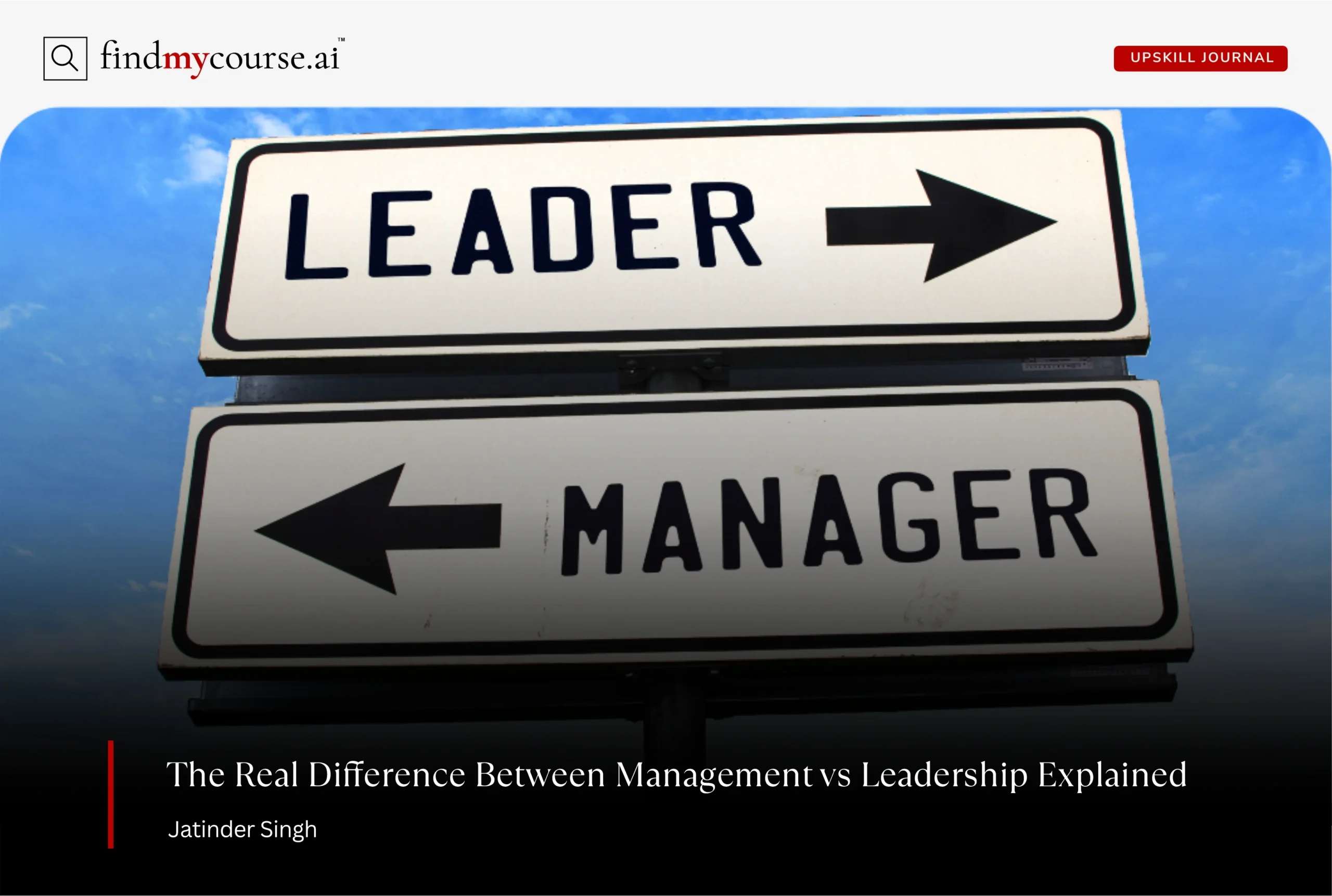Ever wondered why some people can inspire teams to move mountains while others excel at keeping everything running like clockwork? The answer lies in understanding management vs leadership—two powerful forces that shape every successful organization.
In today’s rapidly changing world of hybrid work, AI-driven decisions, and continuous transformation, professionals can no longer afford to be just one or the other. Managers keep the engine running; leaders decide where it’s going. And those who master both don’t just survive change—they drive it.
Whether you’re stepping into your first supervisory role or preparing to lead a global team, learning the difference between managing and leading can redefine your career trajectory. Let’s explore how these two distinct yet connected skills can help you inspire, execute, and grow.
What Is Management? The Science of Order and Efficiency
Management is often described as the backbone of an organization. It focuses on processes, systems, and the day-to-day operations that keep things running smoothly. Managers plan, organize, control, and measure performance to achieve specific goals efficiently.
A good manager ensures that tasks are completed on time, budgets are respected, and teams meet expectations. They rely on structure, data, and clear communication to maintain consistency and predictability. In essence, management is about execution—turning strategy into tangible results.
However, management doesn’t stop at supervision. Modern managers must also foster collaboration, embrace technology, and understand human motivation. They balance productivity with empathy, ensuring that systems serve people, not the other way around.
What Is Leadership? The Art of Vision and Inspiration
While management centers on structure, leadership thrives on vision. Leaders look beyond immediate tasks to inspire others toward a shared future. They don’t just direct people—they empower them.
Leadership involves setting direction, communicating purpose, and motivating teams to reach beyond what seems possible. Great leaders create trust, nurture creativity, and model resilience. They understand that people follow belief and authenticity more than authority.
Leadership is emotional, intuitive, and deeply human. It focuses on transformation rather than administration. While a manager might ask, “How can we do this better?”, a leader asks, “Why are we doing this at all—and how can we make it meaningful?”
The Key Differences Between Management vs Leadership
While both management and leadership aim to drive success, they do so through very different approaches. Understanding how management vs leadership differ helps professionals navigate modern workplaces with clarity and confidence. Managers thrive on structure, systems, and measurable outcomes, while leaders ignite passion, innovation, and purpose. These distinctions are not about superiority but about complementarity—each essential for a healthy, high-performing organization.
| Aspect | Management | Leadership | Detailed Insight |
| Focus | Systems, processes, and performance metrics. | People, vision, and long-term purpose. | Managers build frameworks that ensure order and consistency, while leaders prioritize meaning and direction to keep teams inspired. |
| Approach | Controls, coordinates, and optimizes. | Empowers, motivates, and transforms. | Managers rely on policies and planning to achieve efficiency; leaders create emotional connection and belief to unlock potential. |
| Time Horizon | Operates in the present and near future. | Looks ahead to shape the future. | Management ensures today’s operations run smoothly; leadership envisions what tomorrow could be and guides others toward it. |
| Source of Power | Derived from authority, title, or position. | Earned through trust, influence, and integrity. | Managers gain compliance through structure; leaders gain commitment through credibility and authenticity. |
| Measurement of Success | Based on productivity, control, and output. | Based on growth, innovation, and transformation. | Management success is quantifiable; leadership success is cultural—measured by engagement, resilience, and progress. |
Understanding these distinctions helps professionals blend structure with inspiration—an essential balance for thriving in dynamic, fast-changing workplaces where agility, empathy, and innovation drive sustainable success.
How Management and Leadership Work Together
In high-performing organizations, management and leadership operate in harmony. Understanding management vs leadership is less about comparison and more about collaboration. Management provides structure and consistency, while leadership brings purpose and inspiration. When both align, teams not only achieve goals efficiently but also grow with shared vision and motivation.
How they complement each other:
- Management builds order; leadership drives meaning. Managers focus on planning, organizing, and monitoring progress, often using tools like Asana or Trello to streamline workflows and boost team transparency, while leaders motivate teams to see the “why” behind their work.
- Management ensures accountability; leadership encourages adaptability. Managers maintain structure and timelines, while leaders guide people through change with empathy and creativity.
- Management executes strategy; leadership shapes direction. Managers turn ideas into action, but leaders provide the vision that ensures those actions lead to long-term success.
Together, they create balance—combining operational precision with human inspiration to sustain lasting growth.
Leadership vs Management in Today’s Workplace
In 2026, workplaces are transforming faster than ever. Hybrid teams, AI-driven workflows, and skill-based hiring are reshaping how professionals operate and grow. The conversation around management vs leadership is no longer theoretical—it’s a career essential. According to Gallup’s “Global Indicator: Leadership & Management” research, organizations that effectively combine strong management with empowering leadership see higher engagement, stronger performance, and more resilient workplace cultures. These findings reinforce that companies nurturing both structure and vision consistently outperform others in productivity, innovation, and employee engagement.
The modern professional must therefore master both dimensions. Managing ensures execution; leading ensures inspiration. The future belongs to the leader-manager—someone who combines structure with empathy, precision with purpose, and logic with heart.
Why mastering both matters:
- Balanced Growth: Management builds reliability and accountability; leadership drives creativity and motivation.
- Career Versatility: Those skilled in both can adapt across industries, teams, and organizational changes.
- Strategic Impact: Managers ensure goals are achieved efficiently, while leaders align those goals with long-term vision.
- Human Connection: Leadership fosters trust and engagement, which in turn enhances managerial success.
- Employability Edge: Recruiters now favor professionals who think strategically, act empathetically, and execute effectively.
Ultimately, focusing only on management may make you efficient but inflexible, while focusing only on leadership may make you visionary but detached from results. True career success lies in blending the two—executing with precision while inspiring with purpose.
Final Thoughts
In the end, management vs leadership isn’t a competition—it’s a collaboration that defines true professional excellence. Management turns vision into reality through strategy and structure, while leadership transforms reality into progress through vision and inspiration. One sustains performance; the other sparks transformation.
To thrive in today’s evolving workplace, you must embody both—the clarity of a manager and the courage of a leader. Manage processes with precision, but lead people with purpose. Keep learning, adapting, and growing, because the future belongs to those who can organize effectively and inspire authentically.
When management and leadership work hand in hand, you don’t just achieve goals—you create lasting impact, build stronger teams, and set new standards for success.


